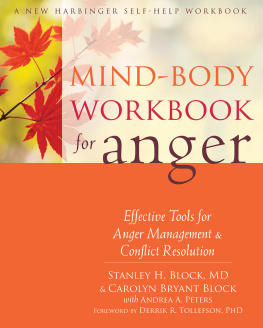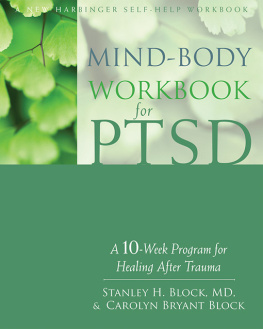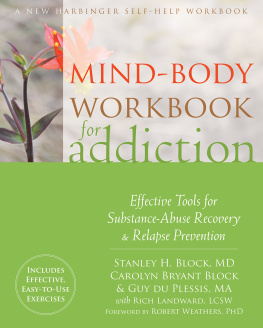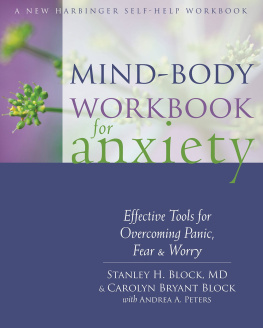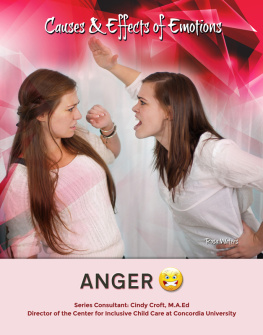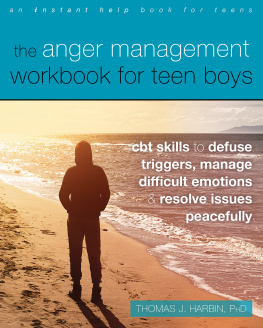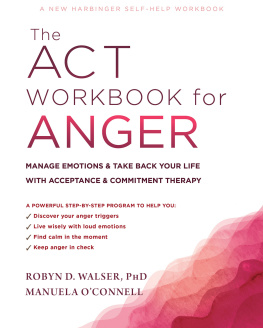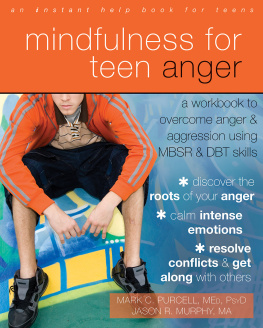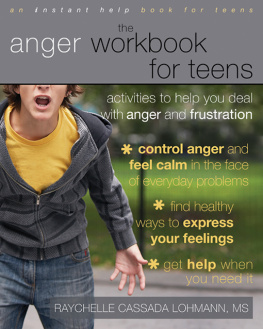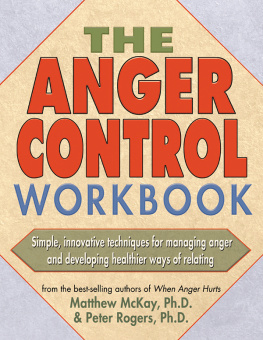Stanley H. Block, MD, is adjunct professor of psychiatry at the University of Utah School of Medicine, and a board-certified psychiatrist and psychoanalyst. He is a consultant on the medical staff at US Army and Veterans Administration Hospitals. He lectures and consults with treatment centers worldwide and is coauthor of Mind-Body Workbook for Stress, Mind-Body Workbook for PTSD, and Come to Your Senses. He and his wife, Carolyn Bryant Block, live in Copalis Beach, WA. Find out more about his work online at mindbodybridging.com.
Carolyn Bryant Block is coauthor of Bridging the I-System, Come to Your Senses, Mind-Body Workbook for PTSD, and Mind-Body Workbook for Stress. She is also the co-developer of mind-body bridging and identity system (I-System) theory and techniques.
Andrea A. Peters is an educator certified in mind-body bridging. She guided the organizational development of mind-body bridging material.
Foreword writer Derrik R. Tollefson, PhD, is associate professor and coordinator of the MSW program at Utah State University. He teaches courses on family violence and frequently provides training on this topic.

This mind-body workbook for anger sets the standard for the treatment the entire spectrum of anger management issues, including court mandated treatment for domestic violence offenders. Mind-body bridging is a set of powerful techniques that will help one to rest the system in ones brain (the I-System) that is responsible for unmanaged anger. I have been in practice twenty years and have found that the tools in this workbook are far superior, better accepted, and more quickly effective than any that I have used with court-ordered domestic violence offenders. Long-term follow-up of recidivism showed rates of only eight percent. Further, I have used and continue to use mind-body bridging in my own life with transformational results.
Kevin Webb, MSW, LCSW, clinical consultant and therapist, Utah Division of Child and Family Services
Stan and Carolyn have done it again. The Mind-Body Workbook for Anger is a user-friendly, easy-to-apply solution to the problem of anger management. In my long career in treating domestic violence offenders, no other method or technique can compare with it. This book should be on top of the list for both therapists and clients.
Jules Shuzen Harris, EdD, author of Anger: It Has Something to Teach Us: Can We Listen
As a psychotherapist, I have been actively involved with domestic violence coalitions and treatment agencies. Anger-management treatment programs based on this Mind-Body Workbook for Anger dramatically reduce dropout rates and recidivism in comparison with conventional treatment methods. In fact, with the favorable results of a large randomized control trial awaiting publication, mind-body bridging is en route to becoming the first evidenced-based treatment and best practice for domestic violence offenders.
Isaac Phillips, MSW, LCSW, executive director of Equinox Counseling Services; co-chair of the Salt Lake Area Domestic Violence Coalition; and member of the Utah Council for Domestic Violence Perpetrator Treatment
Research I conducted with domestic violence offenders using mind-body bridging as an intervention found the offenders experienced less stress; gained greater access to problem-solving abilities; and improved their relationships with partners, children, and co-workers. The mind-body bridging approach helped these at-risk individuals avoid reoffending largely by sharpening ability to recognize internal triggers. In my experience, the mind-body bridging techniques used in the Mind-Body Workbook for Anger are successful because they are practical, straightforward, and allow individuals to see results immediately.
Elisa Audo, PhD, author The Experience of Mind-Body Bridging as a Treatment for Offenders of Domestic Violence, doctoral dissertation, California Institute of Integral Studies, 2012, San Francisco, CA
Publishers Note
This publication is designed to provide accurate and authoritative information in regard to the subject matter covered. It is sold with the understanding that the publisher is not engaged in rendering psychological, financial, legal, or other professional services. If expert assistance or counseling is needed, the services of a competent professional should be sought.
Distributed in Canada by Raincoast Books
Copyright 2013 by Stanley H. Block and Carolyn Bryant Block
New Harbinger Publications, Inc.
5674 Shattuck Avenue
Oakland, CA 94609
www.newharbinger.com
Cover design by Amy Shoup
Acquired by Jess OBrien
Edited by Nelda Street
All Rights Reserved
Foreword
Emotion dysregulation has led to an incomprehensible tally of negative consequences for individuals, couples, families, and communities. It follows, then, that an intervention capable of effectively and efficiently helping people regulate their emotions holds enormous potential to alleviate suffering. It is this potential that led me to encourage my colleague Dr. Stanley Block to publish a workbook that applies his mind-body treatment approach, mind-body bridging, to that form of emotion dysregulation that we refer to as anger. I have eagerly anticipated the publication of this workbook, because I have personally witnessed how mind-body bridging empowers individuals to change their lives and relationships for the better. I have published empirical research that supports the effectiveness of mind-body bridging for domestic violence offenders (Tollefson et al. 2009). I have applied mind-body bridging in my clinical practice with domestic violence offenders and other clients who experience problems with emotion regulation. I have also integrated mind-body bridging into my own life. Through these experiences, I have come to greatly appreciate how mind-body bridging can change lives in ways that lead to lasting personal and relational fulfillment.
This workbook will help individuals learn how to apply mind-body bridging to resolve emotion regulation problems, including anger. I use the word resolve purposely: mind-body bridging is not an anger management strategy; if applied correctly, it is an intervention that will eliminate destructive and dysfunctional forms of emotion dysregulation, including anger. Consequently, this workbook can be used in anger management groups or by anyone who could benefit from improved emotion regulation. This workbook is particularly well suited to intervention programs for domestic violence offenders, given that research has shown that most abusers suffer from some form of extreme body tension and emotion dysregulation (Dutton and Sonkin 2002; Rosenberg 2003). Thus, improving emotion regulation is critical to successful domestic violence treatment.
Mind-body bridging holds that the key factor in understanding the root cause of dysfunctional or destructive behavior like domestic violence lies in understanding the mind-body state of the person prior to the aggressive outburst (for example, thoughts spinning wildly, body numb and full of tension, narrowed awareness of surroundings). This mind-body state is likely to explode into a violent outburst. When individuals are asked what sets off this explosive state, the array of answers may include: She doesnt appreciate how hard I work, She knows I cant stand a dirty kitchen, Its his sarcastic tone of voice, or The kid left the bike in the driveway. Mind-body bridging asserts that the explosive state is the result of the overactivity of a system in our body called the Identity System, which functions by constructing and maintaining a thought picture of how we and the world should be at any given moment. These thoughts are called requirements (for example,

